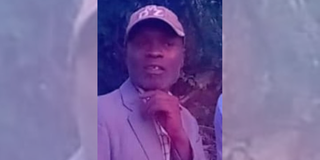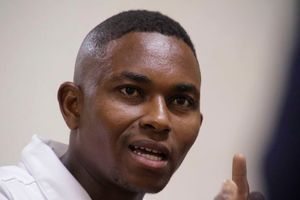
Charles Gathungu, an avocado trader, died in a police cell in Murang'a after being arrested with his mistress.
The last hours of Charles Gathungu's life are shrouded in contradictions.
Arrested after a quiet afternoon drink, he was dead by nightfall - his body found in a police cell in circumstances his family say are deeply suspicious.
The authorities insist it was a suicide, but his wife and mistress, unusually united in their grief, are unconvinced.
It all began on March 12 when Gathungu, 53, an avocado broker from Murang'a, took his 32-year-old mistress, Caroline Njoki, to KK Bar in Kiria-ini for a drink.
Surprisingly, his wife, Milkah Wambui, had no objections - she was fully aware of her husband's extramarital affair.
But the outing took a dark turn when police officers raided the bar at around 3 pm and arrested Ms Njoki.
Moments later, Gathungu followed them to Kiria-ini police station - just 200 metres away.
He was arrested on arrival. Hours later, he was dead.

Will the truth behind Charles Gathungu's death ever be revealed?
Suicide or Foul Play?
Ms Wambui and Ms Njoki, united in grief, reject the suicide claim and demand answers, backed by Murang'a Senator Joe Nyutu, who has called for an independent investigation by the Independent Policing Oversight Authority (Ipoa) and the Independent Medico-Legal Unit (Imlu).
"All the evidence points to the possibility of police brutality. We need independent investigators to give a blow-by-blow account of the events that led to Gathungu's death," said Senator Nyutu.
Murang'a County DCI Obed Isanda said: "The death has been ruled as self-inflicted while in police custody, but we are open to evidence that may indicate otherwise."
Ms Hannah Maina, Imlu's representative in Murang'a County, confirmed that they had launched investigations to verify the police version of events.
A post-mortem carried out by Dr Kamotho Waitenga at Kiria-ini Mission Hospital found that the cause of death was "lack of oxygen to the brain due to hanging", with injuries to the neck consistent with this.
But the question remains: was the hanging self-inflicted or murder?
Dr Waitenga noted that while an autopsy could establish the cause of death, it could not determine who was responsible.
Lawyer Kariuki Mwangi said only a public inquest could credibly establish the circumstances of Gathungu's death.
"We need to ask not only how he died, but why the police targeted this bar and carried out what appears to be a selective arrest," he said.
Contradictions Surrounding Death
Mr James Kiranga, a patron at the bar, claimed that there were more than 20 people there, but that the officers specifically targeted Ms Njoki.
"One officer even said: 'This is the woman we are supposed to arrest and take back to Nairobi'," he recalled.
Ms Wambui explained that Ms Njoki had a young child in Nairobi who was often left behind during her visits to Murang'a.
Ms Njoki's mother, who lives abroad, had repeatedly used the police to try to end the relationship, arguing that her grandchild needed parental care in Nairobi.
"It wasn't the first time my husband had been arrested with Ms Njoki. Usually, she would be taken back to Nairobi and he would be released," said Ms Wambui.
Mr Mwangi, the lawyer, insisted: "The dead tell no tales. If Gathungu were alive, maybe this mystery would be solved".
The police report (OB/20/12/03/25) states that Gathungu was found hanging in his cell, still breathing. Officers allegedly rushed him to Kiria-ini Mission Hospital, where he died while receiving oxygen.
But the hospital strongly contradicted this version.
"The officers brought a man lying in the back of a Land Cruiser. He was dead on arrival. We refused to admit him as a patient and told them to record it as a police incident before depositing the body in the mortuary," a hospital statement said.
Police said they found Gathungu after Ms Njoki screamed, but she insists he was assaulted at the bar and later at the station.
"A police officer slapped him twice at the bar. Later, when we were in separate cells, I could hear him screaming in pain," she said.
Police say Njoki and Gathungu were drunk, but a waiter says they had just started their second beer.
Read: 27 nights of terror: Inside the chilling audio diary of teen refugee who recorded her own murder
What Happened to Charles Gathungu?
And while police say Gathungu used his shirt to hang himself, his wife denies this.
"He left the house wearing a T-shirt. When and where did he find a shirt?" she wondered.
Questions also remain about the physical possibility of suicide.
Police cells typically have slippery walls and narrow ventilation grills set high above the floor.
"How could a drunk man climb these walls, make a noose and hang himself?" Ms Njoki asked.
Mr Mwangi, a High Court lawyer, questioned whether the police had acted appropriately during and after the alleged suicide.
"If Gathungu really hanged himself, why didn't they document the scene with photographs before removing the body? Why wasn't a doctor called to confirm that he was still alive?" he asked.
"Crime scene photographs taken by the DCI could have helped establish the truth - but none were taken."
Another aspect that puzzles officers is the architecture of a police cell, which is usually more than a metre high, with slippery walls and only tiny grids for ventilation.
"How a man can jump to tie a knot on the bars, then make a noose and put it around his neck for the suicide mission is very questionable. Whichever way you look at it, this death is a puzzle with many inconsistencies. The police should tell us how Gathungu died," says Mr Mwangi.
Mr Gachucha Manoah, the Murang'a County Executive Committee member for culture, has written to the Ipoa demanding a full investigation.
"As a neighbour of the deceased and a county official, I'm angry that a man can be arrested and die in police custody under such suspicious circumstances," he said.
Mr Gachucha criticised the use of the police to interfere in private relationships between consenting adults.
"There is no legal provision that allows officers to enforce morality or end romantic relationships in the name of public order," he said.
He urged Ipoa to investigate who instructed the officers to target the couple, whether assault took place, why police and medical reports differ, and whether negligence or abuse of power contributed to Gathungu's death.









